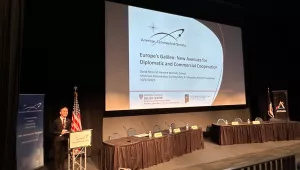
David McCord
David McCord is a Research Assistant to Prof. Eric Rosenbach at the Belfer Center for Science and International Affairs, within the Defense, Emerging Technology, and Strategy (DETS) Program. His work focuses on space navigation, communications, and sustainability policy for which he was notably awarded the AAS Macauley Award. McCord is also a Master in Public Administration (MPA) Candidate at Harvard Kennedy School, where he chairs the space policy student organization Moonshot. Last summer, he served as a NASA contractor in Washington DC. As such, he reported on GPS policy, participated in the US Delegation to UNOOSA, and supported the organization of National Space Council sessions. Before attending Harvard, he served as Science and Technology Counselor for three and a half years at the Swiss Embassy in France. He has previous experiences in consulting and banking, mostly in tech and public sector-related projects. He holds an MSc in Strategic Management from HEC Paris, France, and a BA in Business Administration from the University of St. Gallen, Switzerland.
-
Former Research Assistant, Defense, Emerging Technology, and Strategy Program

